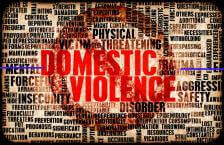6 Surprising Myths About Domestic Violence
On hearing the recent news coverage about Ray Rice, Greg Hardy, and Ray McDonald, many of us thought, “How could anyone do that?” As Savvy Psychologist reveals, the truth about what goes through an abusive man’s head is not always what you’d expect.

For more information, check out the excellent book on which this episode is based: Why Does He Do That?: Inside the Minds of Angry and Controlling Men, by Lundy Bancroft, a male counselor with 20 years’ experience working with abusive men.
While domestic violence can impact anyone, this week’s episode is specifically for women in relationships with the Ray Rices of the world.
Prepare to be surprised…
Myth #1: His previous wife/girlfriend hurt him or cheated on him, so he’s acting out because of what she did to him
Fact: Abusers blame everyone except themselves.
Abusive men almost always badmouth their past partners. He will convince you that his previous girlfriend or ex-wife is full of lies, or that she is out to get him.
However, listen closely to the phrasing he uses. He might blame her for “having him arrested” and “taking the children away from him,” or he might say, “she didn’t let me have any space.” He is putting himself in the victim role.
Also, if he claims an ex-partner cheated on him, he’ll often say he “just knew” or “everybody knew” that she was cheating, but ask him for details and you’ll likely get a vague story, or find he was jumping to conclusions. But blaming his ex creates a reason for you to justify why he’s hitting you. ”Well, it’s just because that crazy woman treated him so badly. That’s why he’s so jealous now.”
This allows him to justify all sorts of bad behavior—affairs, violence, jealousy, controlling your social life—because, he claims, he’s just reacting to how much the previous girl hurt him. “Baby, I got so hurt in the past that now I’m afraid of commitment, so I’ve gotta keep my options open.” “My ex-wife cheated on me so much I can’t bear to let you out of my sight.”
To make this work, he’ll also try to make you feel crazy and at fault. “When you get like this I can’t talk to you–you’re just like her.” “What do you expect me to do when you act just like she did?”
He may tell you he’s doing it for your own good, that he has to save you from yourself, or keep you from becoming like her. But he’s not losing control of himself, he’s taking control of you.
Sponsor: This episode is brought to you by NatureBox. Discover smarter snacking with a new NatureBox each month. Get your first box FREE when you go to NatureBox.com/qdt.
Myth #2: He abuses me because he was abused as a child
Fact: He may have been abused, but that’s not the reason he hits you.
To be sure, many men who hit or emotionally abuse their partners were themselves abused as kids. But many men have also risen above their brutal childhoods and broken that cycle. Being abused doesn’t automatically make you an abuser. Of course, be sympathetic and compassionate to a man who had a lousy childhood, but he cannot use it as an excuse to abuse you.
If he does, he is taking full advantage of your sympathy. An abusive man who points to his abusive childhood as the reason he hits you is, on the surface, giving you a “reason.” However, it’s a dangerous one. He wants you to understand why he hits you, and therefore make it acceptable. Or he needs to make you feel guilty for standing up for yourself.
Be particularly wary if he blames his mother for abusing him.
Be particularly wary if he blames his mother for abusing him, because then he gets to place the blame on a woman to justify abuse of another woman: you.
Bottom line: an abusive man uses an abusive childhood as an excuse to distract from his current behavior. Blaming his unchangeable past grants him carte blanche to stay violent, rather than working to change.
Myth #3: He’s abusive because he’s depressed, traumatized, or has some other kind of mental illness
Fact: Mental illness and abuse are separate issues.
Indeed, some abusers do have a mental illness, but that’s a separate problem from the abuse. And mental illness doesn’t cause abuse—think of all the people in this world who are depressed, alcoholic, drug-addicted, or traumatized who wouldn’t hurt a fly.
Furthermore, the typical abuser is often healthy and functional in the other areas of his life. He often has a good relationships with extended family members, gets good reviews at work, and has friends—none of which are signs of mental illness.
More signs that he’s not mentally ill: his anger isn’t random or driven by delusions. He doesn’t throw or break stuff he cares about. He’s rational enough to understand that you’re not cheating on him just because you had a conversation with another man. He can pull it together instantly when the police come to the house. In short, his crazy-appearing abuse is totally rational.
Abusers do often have a problem with how they manage their emotions. When an abuser feels bad, he lets his anger, sadness, hurt, or frustration grow and grow until everyone else in the house is miserable, too. It won’t stop until someone tries to rescue him, and then he’ll blame that person.
Also, abusers often won’t allow or acknowledge negative feelings in others. He’s allowed to be angry, but if you’re mad, he’ll either mess with your head or let you have it. If you fight back, he’ll claim that you’re abusing him, or that he’s hitting you in self-defense: “I had to smack some sense into you.”
Myth #4: He’s jealous and controlling because he has low self-esteem
Fact: On the contrary, he thinks he’s special.
You might think that if you are there for him or support him enough, you can stop the abuse. Ironically, this just makes things worse. He demands your deference and emotional catering, gets the praise he is seeking from you, but always—always—thinks it’s not enough.
It’s actually the opposite of insecurity—he feels he is special, deserving, and entitled. He considers it a right to have you all to himself, and to punish you if you don’t do what he wants. He thinks you should be grateful for the freedom he allows you, the financial allowance he gives you, or the friends he lets you have. He wants a reward for his generosity, and has no idea he’s being controlling.
In fact, he feels justified. He’ll rationalize the abuse. He’ll tell you, “You know how to get to me.” “You pushed me over the edge.” Just like those embedded in drug addiction or alcoholism, he’ll blame everyone except himself, and then make you feel sorry for him.
If that doesn’t convince you, if you’ve been abused, think about what your partner’s criticisms have done to your self-esteem. I’m guessing it hasn’t turned you into an abuser.
Myth #5: He just needs to get therapy, or we need couples therapy. Then he’ll stop
Fact: The privileges that come with abuse are hard to give up. Abusers often twist therapists around their fingers.
As a psychotherapist, it pains me to call therapy for abusers a myth. But it’s true: individual therapy usually doesn’t help abusive men.
Individual therapy usually doesn’t help abusive men.
Why? He just doesn’t see what he’s doing as abuse, or he firmly believes he is the victim. When he presents this one-sided story to his therapist, he or she will likely believe him, simply because there is no information to the contrary.
He’ll also do a really good job of convincing his therapist—after all, he’s convinced you it’s your fault and that you’re the crazy one, so imagine what he can do with a sympathetic individual who is there to support him.
It’s also important to note that couples therapy is not a good idea for physically violent relationships. Couples therapy focuses on the relationship, and therefore assumes that each partner contributes to the problem. It also allows therapy to focus on issues other than abuse–and of course, you might not be honest when you’re answering questions with your abuser sitting in the next chair over, listening intently. Finally, the therapist can’t keep you safe outside of session. Whatever happens in the therapist’s office unfortunately won’t stay in the therapist’s office—it’ll come home.
Myth #6: But he loves me
Fact: He thinks he owns you.
Finally, he says he loves you, and indeed he might. But he also might be mislabeling the desire to posses you, with no competition from the world, as “love.” When he says, “I love you,” what he really means is, “I own you.”
Look at his actions through the lens of ownership, not love, and suddenly things will make a lot more sense. This is why he gets mad when you show love and attention to others. This is why he gets so threatened when another man talks to you. This is why he encourages you not to pursue your education, tells you what to think, and tries to get you to second-guess your own thoughts and experiences.
A final note: there is nothing wrong with you. You are not crazy, responsible, guilty, or provoking. He holds the keys to the abuse—no one else.
Again, for more information, check out the excellent book that inspired this episode, Why Does He Do That?: Inside the Minds of Angry and Controlling Men, by Lundy Bancroft, a male counselor with 20 years’ experience working with abusive men.
A really important note: Although Ray Rice, Ray McDonald, and Greg Hardy are all African-American, abuse has no specific demographic profile. Abusers come from all backgrounds: rich, poor, educated, uneducated, professional, working class, minority, and white.
And while I’ve focused this episode on heterosexual relationships where the man is the abuser, please note that all these myths apply to same-sex abusive relationships, as well. For more information about domestic violence when a heterosexual man is the victim, check out Can Men Be Victims of Domestic Violence?
You May Also Like…








